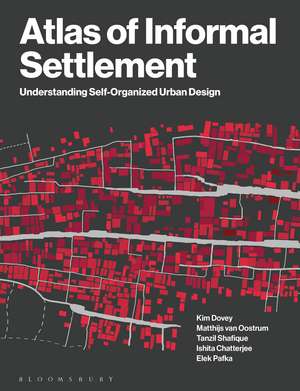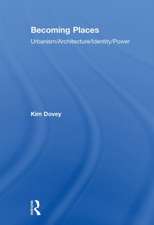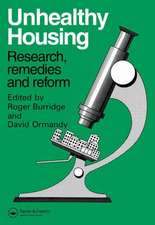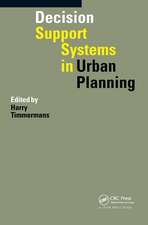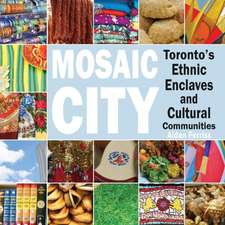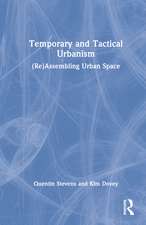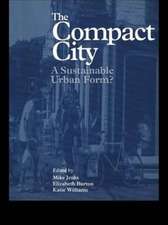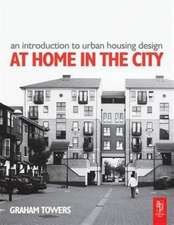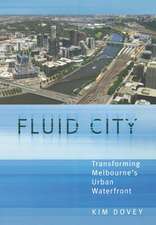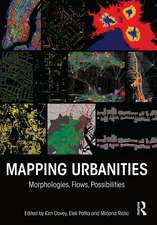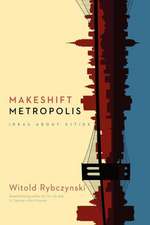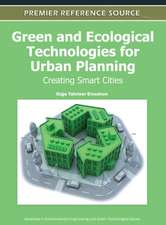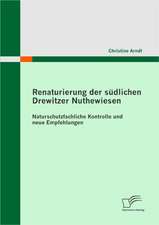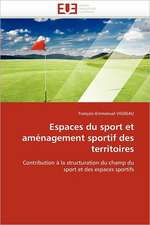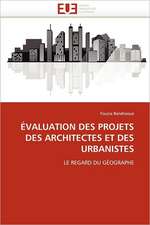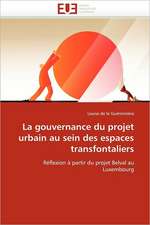Atlas of Informal Settlement: Understanding Self-Organized Urban Design
Autor Kim Dovey, Matthijs van Oostrum, Tanzil Shafique, Ishita Chatterjee, Dr Elek Pafkaen Limba Engleză Hardback – 4 oct 2023
| Toate formatele și edițiile | Preț | Express |
|---|---|---|
| Paperback (1) | 176.05 lei 3-5 săpt. | +46.82 lei 7-13 zile |
| Bloomsbury Publishing – 4 oct 2023 | 176.05 lei 3-5 săpt. | +46.82 lei 7-13 zile |
| Hardback (1) | 466.81 lei 3-5 săpt. | |
| Bloomsbury Publishing – 4 oct 2023 | 466.81 lei 3-5 săpt. |
Preț: 466.81 lei
Preț vechi: 575.94 lei
-19% Nou
Puncte Express: 700
Preț estimativ în valută:
89.34€ • 92.56$ • 74.56£
89.34€ • 92.56$ • 74.56£
Carte disponibilă
Livrare economică 01-15 martie
Preluare comenzi: 021 569.72.76
Specificații
ISBN-13: 9781350295049
ISBN-10: 1350295043
Pagini: 304
Ilustrații: 400 colour illus
Dimensiuni: 189 x 246 mm
Greutate: 0.45 kg
Editura: Bloomsbury Publishing
Colecția Bloomsbury Visual Arts
Locul publicării:London, United Kingdom
ISBN-10: 1350295043
Pagini: 304
Ilustrații: 400 colour illus
Dimensiuni: 189 x 246 mm
Greutate: 0.45 kg
Editura: Bloomsbury Publishing
Colecția Bloomsbury Visual Arts
Locul publicării:London, United Kingdom
Caracteristici
Case studies include settlements in: Abidjan, Accra, Addis Ababa, Bangalore, Bissau, Bogotá, Buenos Aires, Cairo, Cape Town, Damascus, Delhi, Dhaka, Haikou, Hanoi, Istanbul, Jakarta, Johannesburg, Kampala, Karachi, Kolkata, Labuan, Lima, Luanda, Manila, Mexico City, Mumbai, Nairobi, Ouagadougou, Port-au-Prince, Rio de Janeiro, San Salvador, São Paulo, Tunis and Ulaanbaatar
Notă biografică
Kim Dovey is Professor of Architecture and Urban Design at the University of Melbourne. Matthijs van Oostrum currently works with UN-Habitat, Nairobi. Tanzil Shafique is Lecturer in Urban Design at the University of Sheffield. Ishita Chatterjee is Associate Professor at the Jindal School of Art and Architecture, O.P. Jindal Global University. Elek Pafka is Senior Lecturer in Urban Design and Planning at the University of Melbourne.The authors are all associated with InfUr- the Informal Urbanism Research Hub at the University of Melbourne.
Cuprins
List of figuresList of authorsAcknowledgementsPart A INTRODUCTION: Informal Settlement as a VerbPart B METHOD: Mapping Informal Assemblages Part C SETTLEMENT Part D MORPHOGENESIS: The Spatial Logic of Self-Organized Urban Design Part E REFERENCES GlossaryIndex
Recenzii
The Atlas demonstrates the indispensable value that is generated by investigating the spatial logic of informal settlement, as this exposes factors often overlooked in broad-brush statistics and geospatial analysis based on artificial intelligence. Focusing on fifty-one sites, the Atlas offers a nuanced spatial analysis at different scale levels and reveals the processes and outcomes of self-organized urban design. In doing so, it offers learnings for context-sensitive policies for affordable housing and neighbourhood infrastructure in rapidly growing cities.
We know very little about most of the informal settlements that house over a billion urban dwellers. This book advances and deepens our understanding of these settlements' development and expansion over time in all their diversity and complexity.
This is a vital empirical consolidation of the heterogeneous ways urban settlements are being composed and governed. The "informal" is always extending itself across new terrain and vernaculars; something always being worked and worked on in incessant processes of becoming unsettled and resettled.
We know very little about most of the informal settlements that house over a billion urban dwellers. This book advances and deepens our understanding of these settlements' development and expansion over time in all their diversity and complexity.
This is a vital empirical consolidation of the heterogeneous ways urban settlements are being composed and governed. The "informal" is always extending itself across new terrain and vernaculars; something always being worked and worked on in incessant processes of becoming unsettled and resettled.
